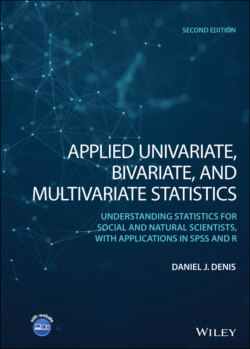Читать книгу Applied Univariate, Bivariate, and Multivariate Statistics - Daniel J. Denis - Страница 19
1.7 AS A SCIENTIST, HOW MUCH MATHEMATICS DO YOU NEED TO KNOW?
ОглавлениеThe answer to this question is, of course, as much as possible, for working through problems of any kind can only serve to hone your analytical and deductive abilities. Even working through problems completely unrelated to statistics can help your statistical abilities, because they give you practice in “figuring things out.” However, that answer is, of course, a naïve if not idealistic one, since there is only so much time available for study and the study of statistics must be balanced by your own study of your chosen field.
For example, if the biology student became immersed in mathematics and statistics full‐time, then that student would no longer be a student of biology. It can be exceedingly difficult to apply a statistical technique and interpret the results of such a technique in a field for which you are not familiar. If you are unaware of the substantive objects you are working with, that is, the “stuff” on which the statistics are being applied, then regardless of your quantitative expertise, you will often have difficulty interpreting the scientific result. Likewise, if spending too much time computing higher‐order derivatives, the student of animal learning, for instance, will have little time remaining to study the learning patterns of the rats he is conditioning, or to speculate on theoretical advancements in his field. Hence, a “happy medium” is required that will balance your study of your substantive area along with the technical quantitative demands of your field of study. Indeed, even for those who specialize exclusively in statistics, the American Statistical Association strongly advises aspiring statisticians to choose a field of application. As a researcher, you will be expected to apply modeling techniques that are quite advanced (entire courses are devoted to the statistical technique you may be applying), and so you will face the opposite problem, that of choosing to specialize in statistics (to some extent) so that you may better understand the phenomena of your own science. Hence, regardless of whether one is coming from a mathematics or science background, one should aspire for a healthy mix of scientific and statistical expertise. Computing experience (e.g., R, SPSS, SAS, etc.) should also be part of your “repertoire” of skills. As an applied scientist, you should probably find yourself in the data science or traditional research intersections in the following Venn diagram.
Source: From Drew Conway, THE DATA SCIENCE VENN DIAGRAM, Sep 30, 2010. Reproduced with permission from Drew Conway.
